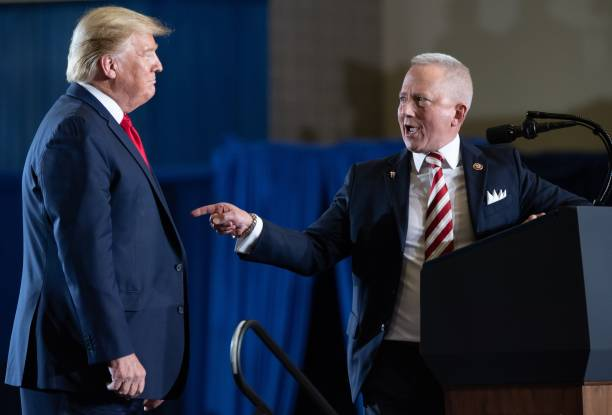NJ Republican says he saved $1B hospital program. Now it will lose $800 million.
Aug. 1, 2025, 7:01 a.m.
Rep. Jeff Van Drew has touted how he worked behind the scenes with Trump so that NJ hospitals weren’t “left behind.”

New Jersey Rep. Jeff Van Drew has been touting how he worked with President Donald Trump and his Senate colleagues to preserve a New Jersey program that allows certain counties to direct millions in federal funding to local hospitals each year — even as his fellow Republicans cut $1 trillion from Medicaid.
“New Jersey hospitals were at risk of being left behind,” Van Drew said in a statement the day before Trump signed the cuts into law. “I made it clear to congressional leadership that I would not accept any legislation that did not correct this issue.”
But under Trump’s new tax law, federal spending on New Jersey’s County Option tax program is now scheduled to ramp down between fiscal year 2028 and 2032. According to an analysis by the New Jersey Department of Human Services, roughly $800 million dollars in federal funding will be lost by 2032.
New Jersey’s County Option program is limited to hospitals that serve a significant number of lower-income residents, aiming to boost Medicaid funding where presumably it’s needed the most. The loss of funding to the program raises questions about whether Van Drew –- who represents a district where 20% of the population rely on Medicaid – is truly fulfilling his promise that he wouldn’t support legislation that targeted vulnerable people’s health care.
Van Drew’s office did not respond to questions about the funding diminishing over time.
Hospitals in 14 New Jersey counties are currently eligible under the program. Eligible hospitals pay a fee to the county and get their federal Medicaid reimbursements boosted in return. Trump’s bill places a limit on the amount that hospitals can be reimbursed under this program.
Kathy Bennett, president and CEO of the New Jersey Hospital Association, said Van Drew’s amendment will preserve $2.3 billion in Medicaid benefits since the ramping down of the program from the Trump bill doesn’t kick in until 2028. She said that while the gradual reduction of the "County Option" eases the immediate severity of the cuts, New Jersey will still face serious health care challenges.
“ Over time, New Jersey will face devastating cuts in Medicaid funding,” Bennett said.
Laura Waddall, health care program director at nonprofit NJ Citizen Action, said the cuts and the eventual loss in funding undermine Van Drew’s claim that he worked behind the scenes to save the program.
“There is nothing about health care in the [bill] that should be considered in furtherance of the public good,” she said.
Before eventually voting for Trump’s bill, Van Drew joined 11 other Republican representatives in signing an April letter in which the group vowed not to vote for any bill that cut Medicaid. The group wrote it supported targeted reforms to fix flaws in the Medicaid program that, in the lawmakers’ view, divert resources away from children, seniors, individuals with disabilities, and pregnant women.
“However, we cannot and will not support a final reconciliation bill that includes any reduction in Medicaid coverage for vulnerable populations,” the letter said.
Approximately 126,400 people in Van Drew's district are covered by Medicaid or related program CHIP (Children's Health Insurance Program), according to the Georgetown University Center for Children and Families.
“He made an affirmative vote to betray those constituents,” said Tony Carrk, executive director of Accountable.us, a government watchdog organization.
A Gothamist review of Van Drew’s latest FEC reports shows that he received nearly $20,000 in campaign donations from hospital and physicians’ trade groups with a lot to lose from the cuts, including the American Hospital Association. Its president and CEO Rick Pollack said in a statement on X that his organization spent “months of clearly demonstrating the implications that these Medicaid proposals will have on the patients and communities we serve.”
Prior to the final House vote on Trump’s bill, the American Hospital Association gave Van Drew $4,000. Other donations from medical groups to his campaign during this period included $5,000 from the American Dental Association and $2,500 from the American Society of Anesthesiologists.
The contributions to Van Drew were part of a much larger push from the healthcare industry as the bill was debated. The American Hospital Association made more than $300,000 in political donations this past spring.
But it’s unclear if it got anything in return.
Van Drew’s office didn’t respond to multiple requests for comment on the campaign donations. None of the medical trade groups — from hospitals to pediatric dentists to psychiatrists — responded to questions about what their donations achieved.
Trump is cutting $1 trillion from Medicaid. Here’s what that means for NJ. Medicaid cuts will pummel NY jobs and health care. The Bronx could take the biggest hit.